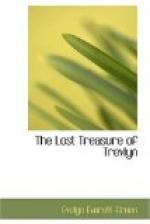The boat had now drifted too far for the conversation to be any longer audible. Jacob gave a long, low whistle, and took to the oars. Cuthbert, who sat beside the priest in the stern, had his hand upon the tiller; and as the fog cloud lifted just a little, so that the darkness about them became hardly more than that of twilight, he looked at the silent, motionless figure beside him, and exclaimed in surprise:
“Father Urban!”
A slight smile hovered for a moment over the wan face of the priest. He lifted his thin hand and said solemnly:
“Peace be with thee, my son.”
Cuthbert bent his head in reverence, and then turned again towards the Father.
“What hast thou done that they should rail at thee thus—thou the friend of the poor, the friend even of the leper? What has come to them that they turn thus against thee? Sure, but a few short weeks ago and thou didst hold back an angry crowd by the glance of thine eye.”
“My son, trust not in the temper of the crowd, in the goodwill of the multitude. Was it not the same crowd who on the Sabbath shouted, ‘Hosanna to the Son of David!’ that on the Friday yelled, ‘Crucify Him! crucify Him!’ Never put faith in man, still less in the multitude that is ever swayed like a reed, and may be driven like a wave of the sea hither and thither as the wind listeth.
“And then I was not amongst mine own flock. I had—rashly, perchance—adventured myself further than I ought, for I had a message of consequence to execute, and I have not been wont to hide myself from my fellow men. But there is no knowing in these fearful times of lawlessness and savage hate what will be the temper either of rulers or people. It seems that I am known—that there is some warrant out against me. So be it. If I must flee from this city to another, holier men have done the like ere now. I would mine errand had been completed. I would I had accomplished my task. But—”
The priest’s voice had been growing fainter for some moments. Cuthbert supposed it to be a natural caution on his part, lest even Jacob should hear him as he plied his oars; but as he came to this sudden stop, he felt that the slight frame collapsed in some way, and leaned heavily against him as he sat. Turning his eyes from the dim, rippling water, so little of which could be seen in the darkness and the fog, to the face of the priest, he saw that it had turned ghastly pale, and that the eyes were glazing over as if with the approach of death. Plainly the fugitive had received some bodily hurt of which he had not spoken, and the question what to do with their helpless burden became a difficult one to answer.
“My father will not receive him,” said Jacob, shaking his head, as he leaned upon his oars and let the boat drift along with the tide that was carrying them towards the bridge. “He hates the priests worse than your good uncle and mine, who has something of a fellow feeling for them in these days of common persecution; and you know well what sort of a welcome we should receive from him did we arrive with a seminary priest in our arms.”




